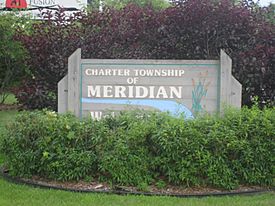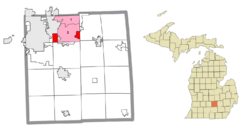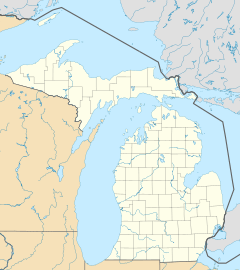Meridian Charter Township, Michigan facts for kids
Quick facts for kids
Meridian Township, Michigan
|
|
|---|---|
|
Charter township
|
|
| Charter Township of Meridian | |

Meridian Charter Township signage along M-43
|
|

|
|
| Country | United States |
| State | Michigan |
| County | Ingham |
| Settled | 1836 |
| Organized | 1842 |
| Area | |
| • Total | 31.57 sq mi (81.8 km2) |
| • Land | 30.49 sq mi (79.0 km2) |
| • Water | 1.08 sq mi (2.8 km2) |
| Elevation | 850 ft (259 m) |
| Population
(2020)
|
|
| • Total | 43,916 |
| • Density | 1,301.7/sq mi (502.6/km2) |
| Time zone | UTC-5 (EST) |
| • Summer (DST) | UTC-4 (EDT) |
| ZIP code(s) | |
| Area code(s) | 517 |
| FIPS code | 26-53140 |
| GNIS feature ID | 1626727 |
Meridian Charter Township is a special kind of local government area in Ingham County, Michigan. It's called a "charter township" because it has more powers than a regular township.
In 2020, about 43,916 people lived here. The township gets its name from the Michigan meridian, which is a special line that forms its eastern border. Meridian Charter Township includes the towns of Haslett and Okemos. It is the third-largest town near the cities of Lansing and East Lansing.
Contents
History
Meridian Township was first settled by pioneers in 1836. Pioneers were early settlers who moved into new areas. In November 1836, a man named Obed Marshall bought a large piece of land near where Haslett is today.
The first settlers built their cabins near Pine Lake, which is now called Lake Lansing. They used the many pine trees to build their homes. Later, this lake became a popular vacation spot. An "interurban trolley," which was like an electric train, ran from Lansing to a resort on the lake. There was even an amusement park that was very popular for many years. Today, the town of Haslett is located on the south side of Lake Lansing.
The first settlers near the current town of Okemos arrived in 1839. Joseph Kilbourne helped his brother-in-law, Freeman Bray, get land there. Bray then divided his land into smaller pieces and sold them to new people moving into the area. This new village was first called Hamilton.
A post office was set up in 1840 and was called Sanford. Joseph H. Kilbourne was the first postmaster.
A well-known Native American leader, Chief John Okemos, often camped in this area. He traveled between this village and another campsite near Portland, Michigan. In 1857, the Michigan government officially changed the village's name to Okemos to honor him.
Meridian Township has a rich history. Joseph Kilbourne, a local resident, played a big part in the decision to move Michigan's state capital from Detroit to Lansing in 1847. A group called the Friends of Historic Meridian keeps old local information and takes care of the historic buildings in the Meridian Historical Village.
Geography
Meridian Township covers about 31.57 square miles (81.77 square kilometers) in total. Most of this area, about 30.49 square miles (78.97 square kilometers), is land. The rest, about 1.08 square miles (2.80 square kilometers), is water.
The Red Cedar River flows through the township.
People and Population
| Historical population | |||
|---|---|---|---|
| Census | Pop. | %± | |
| 1960 | 13,884 | — | |
| 1970 | 23,817 | 71.5% | |
| 1980 | 28,754 | 20.7% | |
| 1990 | 35,416 | 23.2% | |
| 2000 | 39,108 | 10.4% | |
| 2010 | 39,688 | 1.5% | |
| 2020 | 43,916 | 10.7% | |
| 2021 (est.) | 43,988 | 10.8% | |
| U.S. Census Bureau | |||
In 2000, there were 39,116 people living in Meridian Township. There were over 16,400 households, with many of them being families. The population density was about 1,261 people per square mile.
Most people in the township were White (86.36%). There were also people of African American, Native American, and Asian backgrounds. About 2.53% of the population identified as Hispanic or Latino.
About 30.2% of households had children under 18 living with them. Many households were married couples living together. The average household had 2.36 people.
The population was spread out by age. About 23.7% were under 18 years old. About 13.4% were between 18 and 24. The median age was 35 years old. This means half the people were younger than 35 and half were older.
In 2000, the median income for a household in the township was $55,203. For families, the median income was $80,114. The average income per person was $32,190. A small percentage of families and people lived below the poverty line.
See also
 In Spanish: Municipio de Meridian (Míchigan) para niños
In Spanish: Municipio de Meridian (Míchigan) para niños
 | Calvin Brent |
 | Walter T. Bailey |
 | Martha Cassell Thompson |
 | Alberta Jeannette Cassell |



